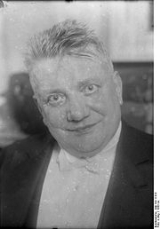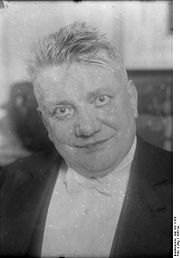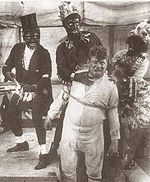
Otto Reutter
Encyclopedia

Coupletist
A coupletist is a poet, singer, or actor who specializes in couplets - wittily ambiguous, political, or satirical songs, usually in cabaret settings, usually with refrains, generally used as a transition between two cabaret numbers....
, and singer.
Born into a poor Catholic family, Reutter attended the Catholic school in Gardelegen and was then trained as a salesman's assistant. After completing his apprenticeship, he moved to Berlin and became active in theater and as a comedian. Afterwards he moved to Karlsruhe and became part of a troupe of tavern singers and comedians there.
In 1895, he first appeared as a "salon humorist", probably in Bern, Switzerland
Switzerland
Switzerland name of one of the Swiss cantons. ; ; ; or ), in its full name the Swiss Confederation , is a federal republic consisting of 26 cantons, with Bern as the seat of the federal authorities. The country is situated in Western Europe,Or Central Europe depending on the definition....
. The following year he had his breakthrough.
Particularly notable about Reutter was his ability to deliver original, amusing lyrics in a singsong manner, his persona full of irony and wit. After a successful appearance in the "Wintergarten Variety" of the Berlin Central Hotel
Berlin Wintergarten theatre
The Berlin Wintergarten theatre was a large variety theatre in Berlin that opened in approximately 1887 and was destroyed by bombs in June 1944. The name was eventually taken on by a theatre in Potsdamer Strasse in 1992....
, Reutter was hailed as a celebrity, and was considered in the following decades as one of the leading artists of the stage in Germany.

Couplet
A couplet is a pair of lines of meter in poetry. It usually consists of two lines that rhyme and have the same meter.While traditionally couplets rhyme, not all do. A poem may use white space to mark out couplets if they do not rhyme. Couplets with a meter of iambic pentameter are called heroic...
s, a German form of amusing cabaret song.

Hyperinflation
In economics, hyperinflation is inflation that is very high or out of control. While the real values of the specific economic items generally stay the same in terms of relatively stable foreign currencies, in hyperinflationary conditions the general price level within a specific economy increases...
struck, Reutter lost a good portion of this fortune and thus had to continue to support himself by delivering his songs on various small stages.
Hence, starting around 1919, his "mature work" began to appear: songs that were especially characterized by humor and melancholy, the wisdom of life, and a kind of weary sass and bite.
His songs didn't just foresee societal changes, but also presented their listeners with comfort in times that required great sacrifice. His songs tended to follow the taste of the times, as well as current events.
Sick and exhausted, Otto Reutter died during a guest appearance in Düsseldorf
Düsseldorf
Düsseldorf is the capital city of the German state of North Rhine-Westphalia and centre of the Rhine-Ruhr metropolitan region.Düsseldorf is an important international business and financial centre and renowned for its fashion and trade fairs. Located centrally within the European Megalopolis, the...
in 1931, and was buried in Gardelegen.
Selected works
- Ach wie fein (wird's in 100 Jahren sein) (um 1900)
- Alles wegn de Leut (1926)
- Berlin is ja so große (1913)
- Der gewissenhafte Maurer (1920)
- Der Überzieher (1925)
- In fünfzig Jahren ist alles vorbei (1920)
- Wir fang'n noch mal von vorne an (1925)
- Das ist so einfach, und man denkt nicht dran (1925)
- Nehm se 'n Alten (1926)
- Mir hab'ne se als jeheilt entlassen (1928)
- Und dadurch gleicht sich alles wieder aus (1928)
- Es geht vorwärts! (1920; 1930)
- Ein Sachse ist immer dabei! (1930)
- Und so kommen wir aus der Freude gar nicht raus (1930)

